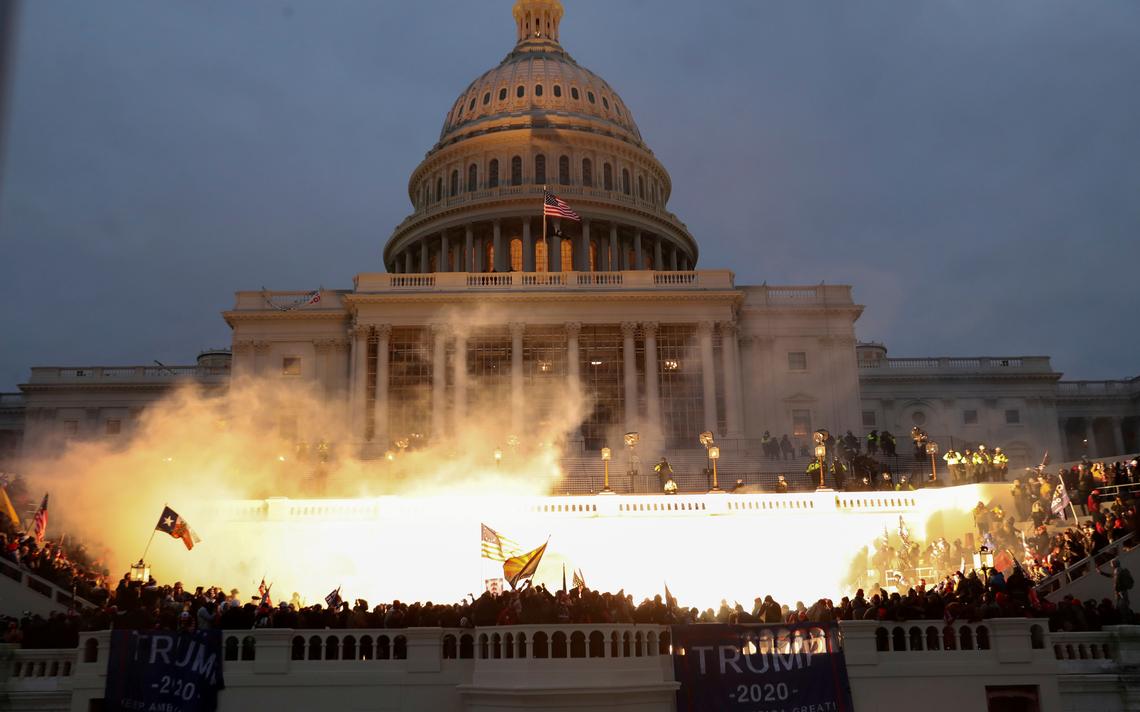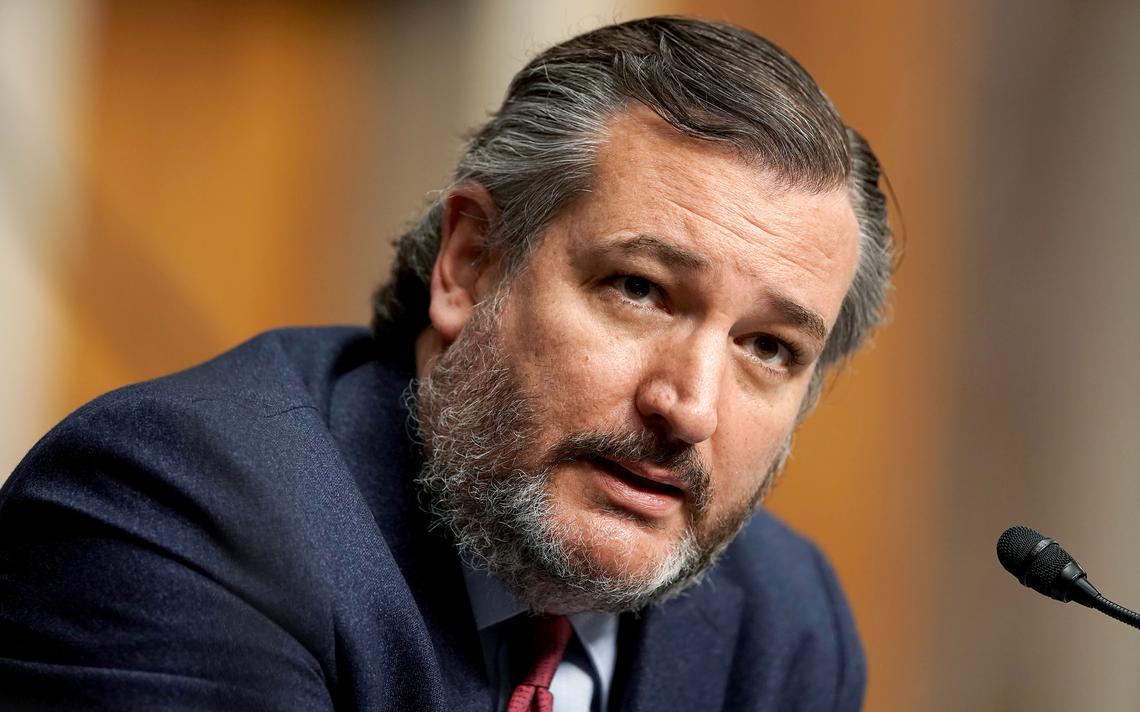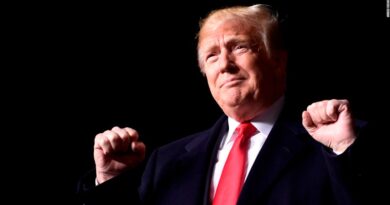Stolen election? Republican lawmakers paralyzed by Trump’s false fraud claims
A month later, the Republican party remains paralyzed by that false narrative. Fully 133 of those lawmakers, or 90%, are now declining to either endorse or repudiate Trump’s continuing insistence that he was cheated by systemic voter fraud, according to a Reuters survey of all 147 lawmakers and a review of public statements they made to explain their votes against certifying the Electoral College results.
Just two of those lawmakers told Reuters they believed the election was stolen through fraud; two others who did not respond to repeated inquiries made similar public statements previously. Ten of the 147 lawmakers told Reuters they do not believe the stolen-election narrative; they cited unrelated reasons for their failed attempt to invalidate millions of votes.
The refusal by the vast majority of the 147 lawmakers to take a firm stand on the truth of Trump’s central claim underscores the political peril they face as they struggle to appease voters on both sides of a rift in the Republican Party.
Many Republican lawmakers believe they can’t survive challenges in party primary elections without the votes of Trump supporters who are enraged at any suggestion that he lost a fair election to Democrat Joe Biden, Republican strategists said. The lawmakers also fear losing general elections against Democrats without the votes of more moderate Republicans and independents who are repelled by Trump’s false fraud claims and his alleged incitement of the Capitol insurrection.
The Reuters survey illuminates a semantic sleight-of-hand many Republican lawmakers have adopted to avoid taking a firm position on stolen-election claims that were discredited by judges in more than 60 lawsuits that failed to overturn the election result. Many lawmakers tried instead to thread a rhetorical needle — saying, for instance, that they would “stand with” Trump to protect “election integrity” or “the Constitution” — while avoiding any mention of Trump’s debunked fraud claims, the Reuters review of their public statements reveals.
Most lawmakers cited legal arguments that some states’ expansions of mail-in or early voting during the coronavirus pandemic violated the U.S. Constitution — a contention rejected by multiple courts in Trump’s failed challenges to the election result.
RELATED: Canada first country to name ‘neo-fascist’ Proud Boys a terrorist entity
The lawmakers who declined to provide a yes-or-no answer to the Reuters survey included some of the most strident backers of Trump’s bid to overturn the election, such as Rep. Mo Brooks of Alabama. Brooks spoke at Trump’s rally before the Capitol riots and encouraged “patriots” in attendance to start “taking down names and kicking ass.” In a Jan. 4 public statement explaining his vote to overturn the election results, Brooks railed against “the largest voter fraud and election theft scheme in American history.” But when asked directly by Reuters if Trump lost because of fraud, Brooks avoided a clear answer. He instead relied on technical arguments involving some states’ voting process changes, saying in a statement that Trump lost because some votes, in his view, were not “Constitution-compliant” and “lawful.”
While the vast majority of the 147 lawmakers never endorsed Trump’s outlandish fraud allegations, their support of his bid to overturn the election played a crucial role in perpetuating the stolen-election myth that has become a central flashpoint in American politics. The latest Reuters/Ipsos poll on the subject, taken Jan. 20 and 21, shows that 61% of Republicans still believed Trump lost because of election-rigging and illegal voting.
The lawmakers’ attempt to appease newly polarized camps of voters within the Republican Party “won’t fly” with voters on either side of that divide, said Gabriel Sterling, a top Georgia election official — and a Republican — who has been debunking what he called “nonsensical” election fraud claims since the Nov. 3 vote.
“They were trying to have their cake and eat it, too,” he said of the lawmakers.
That won’t work, Sterling said, because future voters will form their opinions on the lawmakers’ actions — their vote to overturn the election — rather than their words explaining their reasons. Both pro- and anti-Trump voters, he said, are going to see “147 people who agree with Trump that the election was stolen.”

An explosion caused by a police munition is seen while supporters of U.S. President Donald Trump gather in front of the U.S. Capitol Building in Washington on Jan. 6. REUTERS/Leah Millis
Some Republicans are fed up in the wake of the Capitol riots they believe Trump incited. In one striking example, Reuters reported this week that dozens of Republicans who worked in the administration of former President George W. Bush are leaving the party out of disgust at the failure of most elected Republicans to disown Trump’s attempt to overturn the election.
Trump’s false fraud claims are likely to figure in his impeachment trial next week in the Senate on a charge of inciting insurrection. Democrats face the steep challenge of convincing 17 Republicans to join in convicting the former president. His lawyers, in a document laying out his defense, have signaled Trump will continue to insist in the proceedings that his stolen-election story is true.
Republican strategist Alex Conant — a former aide to Republican Sen. Marco Rubio of Florida and a former spokesman for the Republican National Committee — said Republican House members largely backed Trump’s bid to overturn the election out of fear of angering his base of voters. But those in more moderate districts — or senators who campaign in statewide races — could pay a heavy political price for their votes against certifying the results.
That dynamic was evident in the Jan. 5 losses by both Republican candidates in two U.S. Senate races in Georgia, who were perceived as strong backers of Trump’s fraud claims.
“Any race where independents are a factor, this becomes very awkward,” Conant said. “Senators are much more hesitant to go down the path of election fraud for that reason.”
Most of the 147 lawmakers come from heavily Republican House districts where voters backed Trump by wide margins. But 43 of them hail from more moderate House districts where they won their general election last November by less than 20 percentage points; within that group, 20 of the lawmakers won by less than 10 points.
Jason Miller, a representative for Trump, did not answer questions from Reuters about its survey results and the refusal of most of the 147 lawmakers to endorse the former president’s stolen-election claim.
The Biden White House did not respond to requests for comment.
Hawley, Cruz deny trying to ‘overturn’ election
On Jan. 6, the two houses of the U.S. Congress held votes on whether to accept the Electoral College results from the states of Arizona and Pennsylvania, though members also questioned other states’ elections during the debates. Congressional certification of the results, which occurs in every U.S. presidential election, has almost always been a formality in which members declare a winner after merely counting Electoral College votes previously submitted by each state, based on its popular vote.
The 147 Republicans who voted to reject the two states’ results included 139 House members — about two-thirds of the party’s House caucus — and 8 of the 51 Republican senators serving at the time in the 100-member chamber.
Reuters asked the office of every lawmaker who voted against the certification of Electoral College results a single question at the heart of the political crisis: Do you believe that Donald Trump lost the election because of voter fraud? Reporters then followed up with each office to seek a yes-or-no answer and additional comment.
The vast majority — 133 — either declined to answer or did not respond to repeated inquiries. Reuters also reviewed all the lawmakers’ public statements and Twitter postings explaining their votes. For some members, Reuters also reviewed public statements and speeches at a rally Trump held just before the riot and on the floor of Congress before the vote on the election results.
The two senators who led the coalition of Senate objectors — Ted Cruz and Josh Hawley — both avoided directly endorsing Trump’s fraud claims even as they pushed for a special commission to investigate them. Both have faced backlash from corporate donors and moderate Republicans in the wake of the riots, as have many of the lawmakers who voted to reject Electoral College results.
A spokesman for Cruz declined to answer the Reuters survey question or to provide additional comment. Representatives for Hawley did not respond to repeated inquiries.

U.S. Senator Ted Cruz, R-Texas, questions nominee for United Nations Ambassador Linda Thomas-Greenfield during her Senate Foreign Relations Committee confirmation hearing on Capitol Hill in Washington, D.C., on Jan. 27. Greg Nash/Pool via REUTERS/File Photo
Hawley, outside the Capitol on Jan. 6, raised his fist in solidarity with protesters as they demanded that the “traitors” in Congress unseat Biden and install Trump. Yet after that protest devolved into a deadly riot, Hawley made no fraud claim in explaining his vote against the election results on the Senate floor. He instead focused solely on the argument that the Pennsylvania legislature in 2019 — which was then, as now, controlled by Republicans — violated the state constitution by expanding mail-in voting.
That’s the same argument from a failed lawsuit filed by Pennsylvania Congressman Mike Kelly and other plaintiffs. The state Supreme Court called the suit’s timing “beyond cavil” — meaning petty — noting that plaintiffs waited until after Trump lost to object to a law the state legislature passed in 2019, with bipartisan support, and to seek the “extraordinary” remedy of nullifying 6.9 million votes. The U.S. Supreme Court denied a petition to review the state court decision.
Both Cruz and Hawley, echoing many other lawmakers, have said they never intended to overturn the election.
“Let me be clear,” Cruz said in his speech inside the Capitol on the day of the riots. “I am not arguing for setting aside the result of this election.”
Days earlier, Cruz gave a different answer when pressed on the goal of his support for the idea of appointing an investigative commission into electoral fraud. Fox News host Maria Bartiromo asked him: What happens if the commission finds fraud?
“Then the results would have to be set aside,” he said, arguing that the nation’s founders gave Congress the ultimate power to determine “what counts as a valid vote.”
‘Absurd’ legal arguments
After the riots, Cruz condemned Trump’s stolen-election rhetoric as reckless even as the senator continued to defend his vote to overturn the results. Trump never proved his claims of “massive fraud” or that the election was “stolen everywhere,” Cruz said in his podcast, the Verdict, on Jan. 23. “That’s not responsible, and you’ve never heard me use language like that.”
Conant, the Republican strategist, said such careful and contradictory positioning may not insulate the lawmakers who voted to overturn the results from blowback in future elections.
“Nuance is rarely a successful message in politics,” Conant said. “Whenever politicians try to be lawyerly or have it both ways, they end up turning off more people.”
RELATED: In uneasy truce, House Republicans fail to punish Greene or Cheney
In interviews and public statements, some of the 147 lawmakers now say their objections had nothing to do with voter fraud. More than 80 of them have cited one particular constitutional argument. They contend that, in battleground states Trump lost, state courts and election officials violated the U.S. Constitution by making procedural changes such as expanding mail-in voting or extending vote-counting deadlines without a vote of their state legislature.
That theory was rejected by judges ruling on some of the lawsuits filed by Trump and his allies, including a federal judge in Wisconsin who said it lacked “common sense.” Lawrence Douglas — a legal scholar who called the argument “absurd” — said such procedural changes by state election officials or courts are “quite routine,” and regularly delegated by state legislatures to election administrators.
Douglas, an election law specialist at Amherst College, said the passage of the Constitution cited by lawmakers — Article 2, section 1 — says only that state legislatures should determine “the manner” in which electors are chosen, such as by popular vote, as happens in every U.S. state. Process changes such as extending a mail-in ballot deadline have “nothing to do with changing the way electors should be chosen,” Douglas said.
How Democracy fails
Only a handful of the 147 lawmakers are explicitly backing Trump’s stolen-election claims. The two that told Reuters they believed voter fraud robbed Trump of victory are House members Paul Gosar of Arizona and Marjorie Taylor Greene of Georgia.
Two others — House members Louie Gohmert and Ronny Jackson, both of Texas — did not respond to the Reuters survey but have explicitly claimed in other public statements that Trump lost because of voter fraud. A handful of other lawmakers have publicly alleged widespread fraud but did not claim, in their statements explaining their votes, that the alleged fraud was extensive enough to change the election’s outcome.
Greene declined an interview request. A spokesman, Nick Dyer, confirmed that she believes the election was stolen. Greene said Trump “won by a landslide” in one recent video and made other similar statements.
Newly elected in November, Greene has taken a hail of criticism since joining Congress for her history of making allegedly anti-semitic statements and endorsing a host of outlandish conspiracy theories. The debunked theories she has embraced include QAnon, which holds that elite Democrats are part of a cabal of Satan-worshipping pedophiles and cannibals.

U.S. Rep. Marjorie Taylor Greene, R-Ga., wears a “Trump Won” face mask as she arrives on the floor of the House to take her oath of office as a newly elected member of the 117th House of Representatives in Washington on Jan. 3. REUTERS/Erin Scott/Pool
Gosar spokeswoman Jessica Lycos said the Arizona congressman “strongly believes” the election was stolen from Trump, though she added that “we can’t explain how it happened.” Gosar, she said, is convinced that statistical anomalies in Arizona’s election data suggest that hundreds of thousands of ballots had been altered or miscounted.
Arizona Secretary of State Katie Hobbs, a Democrat, called that claim one of many “vague” conspiracy theories that Gosar has promoted. Such baseless claims, she said, undermine “the foundation of our democracy.”
Most of the 10 Republican lawmakers who now say they don’t believe Trump lost a rigged election had previously issued relatively mild statements that avoided any direct allegation of fraud. But one of them — Rep. Madison Cawthorn, newly elected from North Carolina — made a speech at Trump’s rally on Jan. 6, firing up the crowd to “fight” the election result just before the storming of the Capitol.
“The Democrats — with all the fraud they have done in this election — the Republicans hiding and not fighting, they are trying to silence your voice!” Cawthorn shouted in the speech. “They have no backbone!”

Newly elected U.S. Rep Madison Cawthorn, R-N.C., speaks as supporters of U.S. President Donald Trump gather by the White House ahead of Trump’s speech to contest the certification by the U.S. Congress of the results of the 2020 U.S. presidential election in Washington on Jan. 6. REUTERS/Jim Bourg/File Photo
Cawthorn spokesman Micah Bock told Reuters: “Rep. Cawthorn cannot prove fraud.” Bock said Cawthorn instead relied on the same constitutional theory most of his colleagues cited in explaining their votes.
Only Republican leaders can restore voters’ confidence in the security of U.S. elections, and only by firmly repudiating Trump’s fraud claims, said Nicholas Valentino, a University of Michigan political science professor.
“We’ve seen in many other countries how democracy fails,” he said, “and it fails most often in this way — because electoral outcomes are not considered legitimate by the citizens themselves.”
(Reporting by Chris Kahn, Soyoung Kim, Jason Lange, James Oliphant and Tim Reid; additional reporting by Brian Thevenot and Tom Hals; writing by Brian Thevenot; editing by Soyoung Kim and Brian Thevenot)
*** This article has been archived for your research. The original version from INFORUM can be found here ***




